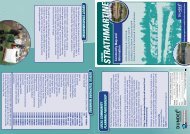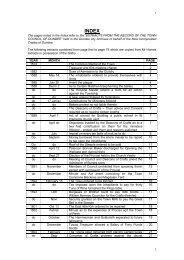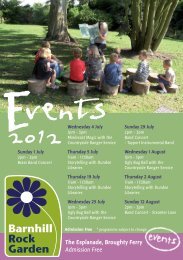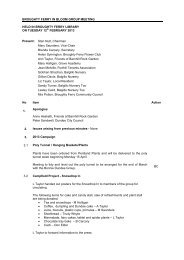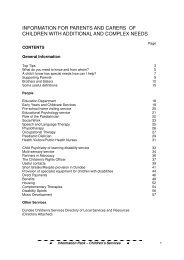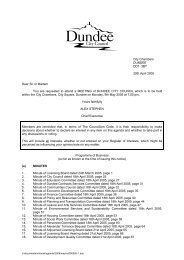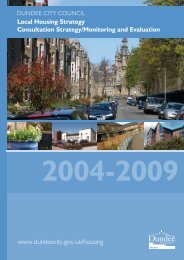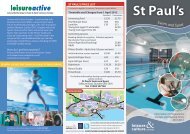Partnership in Practice Agreement - Dundee City Council
Partnership in Practice Agreement - Dundee City Council
Partnership in Practice Agreement - Dundee City Council
You also want an ePaper? Increase the reach of your titles
YUMPU automatically turns print PDFs into web optimized ePapers that Google loves.
The Development<br />
of Services for<br />
People with Learn<strong>in</strong>g<br />
Disabilities and their<br />
Families <strong>in</strong> the<br />
<strong>City</strong> of <strong>Dundee</strong><br />
<strong>Partnership</strong> <strong>in</strong> <strong>Practice</strong><br />
2007-2010
THE DEVELOPMENT OF<br />
SERVICES FOR PEOPLE WITH<br />
LEARNING DISABILITIES AND<br />
THEIR FAMILIES IN THE CITY OF<br />
DUNDEE<br />
PARTNERSHIP IN PRACTICE (PIP)<br />
AGREEMENT 2007-2010<br />
PARTNERSHIP IN PRACTICE 2007-2010 1
The partners to this agreement are:<br />
• <strong>Dundee</strong> <strong>City</strong> <strong>Council</strong><br />
• NHS Tayside<br />
2 PARTNERSHIP IN PRACTICE 2007-2010<br />
PARTNERS<br />
• <strong>Dundee</strong> Community Health <strong>Partnership</strong><br />
• Advocat<strong>in</strong>g Together SAY Project<br />
• <strong>Dundee</strong> College<br />
• Voluntary organisations and private sector agencies who play an<br />
essential part <strong>in</strong> support<strong>in</strong>g people with a learn<strong>in</strong>g disability <strong>in</strong><br />
<strong>Dundee</strong>.
CONTENTS<br />
Introduction ..................................................................................... 4<br />
The Seven Pr<strong>in</strong>ciples ....................................................................... 5<br />
1. Involvement <strong>in</strong> plann<strong>in</strong>g the PIP and other services 6<br />
2. Tak<strong>in</strong>g Control and Stand<strong>in</strong>g Up for Yourself 8<br />
3. Leav<strong>in</strong>g School 11<br />
4. Mov<strong>in</strong>g On 13<br />
5 Liv<strong>in</strong>g Your Life 15<br />
• Employment and Learn<strong>in</strong>g<br />
• Leisure and Relationships<br />
6. Support<strong>in</strong>g Families 18<br />
7. Keep<strong>in</strong>g Healthy 20<br />
• Community Health Services<br />
• Hospital Services<br />
8. Be<strong>in</strong>g Safe 23<br />
9. Gett<strong>in</strong>g About 25<br />
10. Complex Needs: Profound & Multiple Learn<strong>in</strong>g<br />
Disabilities ............................................. 27<br />
11. Complex Needs: Autistic Spectrum Disorder .................. 29<br />
12. Complex Needs: People with Behaviour that<br />
Challenges Services ............................... 31<br />
APPENDIX 1................................................................................ 33<br />
PARTNERSHIP IN PRACTICE 2007-2010 3
Introduction<br />
This is the third <strong>Partnership</strong> In <strong>Practice</strong> agreement (or PIP) for<br />
<strong>Dundee</strong>. It is the plan for develop<strong>in</strong>g services to support people<br />
with learn<strong>in</strong>g disabilities and their families <strong>in</strong> <strong>Dundee</strong> from 2007<br />
to 2010.<br />
The <strong>Partnership</strong> <strong>in</strong> <strong>Practice</strong> agreement (PIP) is an agreement<br />
between <strong>Dundee</strong> <strong>City</strong> <strong>Council</strong>, NHS Tayside, <strong>Dundee</strong><br />
Community Health <strong>Partnership</strong> and other partners. It sets<br />
out plans for care and health services, but it also has plans<br />
for improv<strong>in</strong>g the support available to people with learn<strong>in</strong>g<br />
disabilities and their families and carers <strong>in</strong> other areas, which<br />
are important to them. These other areas <strong>in</strong>clude hous<strong>in</strong>g,<br />
education, employment, leisure and transport.<br />
The need for <strong>Partnership</strong> <strong>in</strong> <strong>Practice</strong> agreements was the first<br />
recommendation of the national review of services for learn<strong>in</strong>g<br />
disabilities <strong>in</strong> Scotland, which was called “The Same As You?”<br />
“The Same As You?” said that there were seven pr<strong>in</strong>ciples that<br />
should be used to support people with learn<strong>in</strong>g disabilities to<br />
lead full and active lives. They are the guide for learn<strong>in</strong>g disability<br />
services <strong>in</strong> <strong>Dundee</strong>, and the pr<strong>in</strong>ciples on which this <strong>Partnership</strong><br />
<strong>in</strong> <strong>Practice</strong> agreement is based.<br />
4 PARTNERSHIP IN PRACTICE 2007-2010
The Seven Pr<strong>in</strong>ciples<br />
People with learn<strong>in</strong>g disabilities should:<br />
• be valued <strong>in</strong> the same way and have the same rights as everyone else<br />
• be seen as <strong>in</strong>dividual people with <strong>in</strong>dividual needs like anyone else, and have<br />
help with writ<strong>in</strong>g, talk<strong>in</strong>g and mak<strong>in</strong>g their ideas heard<br />
• be asked about the services they need and be <strong>in</strong>volved <strong>in</strong> mak<strong>in</strong>g choices<br />
about what they want<br />
• be helped and supported to do everyth<strong>in</strong>g they can and have services which<br />
allow as much freedom as possible<br />
• be able to use the same local services as everyone else, wherever possible<br />
• have special services if they need them as well as and not <strong>in</strong>stead of general<br />
services<br />
• have services, which take account of their age.<br />
The council, NHS board and their partners recognise that people with a learn<strong>in</strong>g<br />
disability and their carers are a diverse group of people and that services need to<br />
take account of peoples age, gender, religion, disability, ethnic background and<br />
sexual preferences.<br />
The <strong>Council</strong>, NHS Board and their partners also recognise the crucial part that<br />
carers play <strong>in</strong> the lives of people with learn<strong>in</strong>g disabilities <strong>in</strong> <strong>Dundee</strong>. This agreement<br />
is <strong>in</strong>tended to reflect the core pr<strong>in</strong>ciple <strong>in</strong> the Scottish Executive report, “The<br />
future of unpaid care <strong>in</strong> Scotland”, that there should be:<br />
• recognition and respect for unpaid carers as key partners and providers <strong>in</strong><br />
the plann<strong>in</strong>g, design and delivery of care.<br />
PARTNERSHIP IN PRACTICE 2007-2010 5
1<br />
1.<br />
Involvement <strong>in</strong> plann<strong>in</strong>g the PIP and other<br />
services<br />
The last PIP said:<br />
• we would ma<strong>in</strong>ta<strong>in</strong> good l<strong>in</strong>ks with parents, carers and families through<br />
mean<strong>in</strong>gful consultation and <strong>in</strong>volvement <strong>in</strong> the strategic plann<strong>in</strong>g of<br />
services<br />
• we would <strong>in</strong>troduce an Involvement Strategy to <strong>in</strong>volve service users and<br />
carers <strong>in</strong> the PIP implementation<br />
• we would <strong>in</strong>volve service users and families <strong>in</strong> tra<strong>in</strong><strong>in</strong>g.<br />
What have we done?<br />
• we have published a User Involvement Policy<br />
• we have gathered the views of a large number of groups and <strong>in</strong>dividuals to<br />
help us write the <strong>Partnership</strong> <strong>in</strong> <strong>Practice</strong> agreement<br />
• we have organised a forum for people who provide services to give their<br />
op<strong>in</strong>ion.<br />
What do you th<strong>in</strong>k?<br />
• people th<strong>in</strong>k these events are a good start and would like to see this<br />
cont<strong>in</strong>ue<br />
• people that use services, their carers and other stakeholders would like to<br />
see better <strong>in</strong>formation about what is available.<br />
What improvements do we plan to make over the next three<br />
years?<br />
• we will establish a Communication and Involvement Group to take the work<br />
forward<br />
6 PARTNERSHIP IN PRACTICE 2007-2010
• we will implement the User Involvement Policy <strong>in</strong> the Learn<strong>in</strong>g Disability<br />
Service and plann<strong>in</strong>g process<br />
• we will look at how to improve communication with stakeholders<br />
• we will facilitate the Providers’ Forum<br />
• we will hold annual events to review the PIP agreement<br />
• we will improve <strong>in</strong>formation about all areas of the service for service users,<br />
carers, families, staff and other agencies. We will provide this <strong>in</strong>formation <strong>in</strong><br />
pla<strong>in</strong> language, <strong>in</strong> an accessible format and ensure that it conta<strong>in</strong>s <strong>in</strong>formation<br />
about the translation service<br />
• we will cont<strong>in</strong>ue to ensure that we actively seek the views of people from<br />
all sections of the community and <strong>in</strong> particular that we seek the views of<br />
people of different ages, genders, religions, disabilities, ethnic backgrounds<br />
and sexual preferences.<br />
PARTNERSHIP IN PRACTICE 2007-2010 7<br />
1
2<br />
2. Tak<strong>in</strong>g Control and Stand<strong>in</strong>g Up for Yourself<br />
The last PIP said:<br />
• people should have access to the <strong>in</strong>formation and support they need to know<br />
the options they have and make their views known<br />
• people need to have more control over their own lives and should be able<br />
to access direct payments if they want.<br />
What have we done?<br />
• <strong>in</strong> <strong>Dundee</strong> 283 people with learn<strong>in</strong>g disabilities now have personal plans<br />
and 3 are receiv<strong>in</strong>g direct payments. Some people get money from the<br />
Independent Liv<strong>in</strong>g Fund (ILF)<br />
• we have reviewed advocacy services<br />
• the SAY Group at Advocat<strong>in</strong>g Together has been talk<strong>in</strong>g with people who<br />
are ready to leave school about a number of issues, and there is a ‘Your Say’<br />
newsletter that provides <strong>in</strong>formation to people.<br />
What do you th<strong>in</strong>k?<br />
• people with learn<strong>in</strong>g disabilities <strong>in</strong> <strong>Dundee</strong> th<strong>in</strong>k that hav<strong>in</strong>g <strong>in</strong>dependent<br />
advocates is a good idea because it helps them speak up for themselves.<br />
They also th<strong>in</strong>k that self advocacy is a good idea. They would like to see<br />
more of both<br />
• some people have experience of a high turnover of workers and want a<br />
longer term commitment from <strong>in</strong>dependent advocates<br />
• there are different views about the role of advocacy. Some people see<br />
Advocates as help<strong>in</strong>g people make their views known and others thought<br />
they had a role to safeguard people’s rights<br />
• it is seen as positive that Independent Advocacy services have been reviewed<br />
so that there will be a better idea of the services that are still needed, and<br />
how to organise them<br />
8 PARTNERSHIP IN PRACTICE 2007-2010
• some people with learn<strong>in</strong>g disabilities and family carers have not heard of<br />
Independent Advocacy or self advocacy, and do not know what it can do or<br />
where to get a service. They would like better <strong>in</strong>formation to be available<br />
• there is a lot of support for person centered plann<strong>in</strong>g<br />
• lots of people with learn<strong>in</strong>g disabilities and carers have experience of be<strong>in</strong>g<br />
<strong>in</strong>volved <strong>in</strong> plann<strong>in</strong>g their support <strong>in</strong> various ways<br />
• there needs to be one name adopted for personal plans and people should<br />
have one plan that moves with them<br />
• people would like more <strong>in</strong>formation about direct payments and the<br />
Independent Liv<strong>in</strong>g Fund (ILF)<br />
• concern is expressed that that the amount of money available for direct<br />
payments is too low and does not take <strong>in</strong>to account th<strong>in</strong>gs such as tra<strong>in</strong><strong>in</strong>g,<br />
or a salary structure which enables staff to progress year on year<br />
• it is also felt that there is too much bureaucracy around direct payments.<br />
What improvements do we plan to make over the next three<br />
years?<br />
• we will set up a sub group of the PIP implementation group around Be<strong>in</strong>g<br />
Heard and Be<strong>in</strong>g In Control. This group will feed <strong>in</strong>to the Review of Advocacy<br />
Services and take forward the work on advocacy, person centred plann<strong>in</strong>g<br />
and direct payments.<br />
• we will complete the review of advocacy services and clarify the role and<br />
functions of all types of advocacy for people will with learn<strong>in</strong>g disabilities and<br />
their carers <strong>in</strong> <strong>Dundee</strong>. This will <strong>in</strong>clude self advocacy. We will restructure<br />
advocacy services to make the best use of resources, and seek to look at the<br />
issues of recruitment and the tra<strong>in</strong><strong>in</strong>g of advocates. The Communication<br />
and Involvement sub group will develop <strong>in</strong>formation for service users, carers<br />
and staff about advocacy services and provide details about where and how<br />
to get advocacy<br />
PARTNERSHIP IN PRACTICE 2007-2010 9<br />
2
2<br />
• we will appo<strong>in</strong>t a direct payment/ILF worker to make this available to more<br />
people. Along with other services, we will review the procedures and<br />
systems for direct payments and simplify these wherever possible. We will<br />
look to improve the <strong>in</strong>formation we provide about both direct payments<br />
and ILF<br />
• we will review the provision of Person Centered Plans (PCP) <strong>in</strong> the Learn<strong>in</strong>g<br />
Disability Service <strong>in</strong> <strong>Dundee</strong> and develop a system <strong>in</strong> which there is one<br />
Person Centered Plan. We will develop a tra<strong>in</strong><strong>in</strong>g programme to ensure a<br />
more coord<strong>in</strong>ated approach to Person Centered Plann<strong>in</strong>g<br />
• we will cont<strong>in</strong>ue to support the development of self advocacy as it is particularly<br />
important that people with learn<strong>in</strong>g disabilities have the confidence and are<br />
supported to communicate and speak up for themselves<br />
• we will cont<strong>in</strong>ue to look at ways to actively promote equality of opportunity<br />
for people to be heard and be <strong>in</strong> control of their lives.<br />
10 PARTNERSHIP IN PRACTICE 2007-2010
3.<br />
Leav<strong>in</strong>g School<br />
The last PIP said:<br />
• leav<strong>in</strong>g school is a big change <strong>in</strong> someone’s life and people should be supported<br />
through leav<strong>in</strong>g school and becom<strong>in</strong>g an adult.<br />
What have we done?<br />
• the college have appo<strong>in</strong>ted a transition worker<br />
• we have brought a group together to look at the issues for people leav<strong>in</strong>g<br />
school<br />
• the SAY reps from Advocat<strong>in</strong>g Together have been talk<strong>in</strong>g to people who<br />
have just left or are about to leave school to f<strong>in</strong>d out what they th<strong>in</strong>k<br />
• An event was organised for people to get more <strong>in</strong>formation<br />
• we have established a Transition Group.<br />
What do you th<strong>in</strong>k?<br />
• people th<strong>in</strong>k it is important that school leavers are well supported as it is a<br />
highly stressful time for them<br />
• people need support to prepare for the future <strong>in</strong>clud<strong>in</strong>g further education,<br />
tra<strong>in</strong><strong>in</strong>g, day and leisure activities, supports for daily liv<strong>in</strong>g and short break<br />
services. A range of opportunities and choices is needed. After fulltime<br />
education, which is wholly funded for young people, there are high<br />
expectations of future support which can be disappo<strong>in</strong>t<strong>in</strong>g<br />
• it is good that school leavers are receiv<strong>in</strong>g services but there is a need for<br />
significant service development<br />
• more <strong>in</strong>formation is needed regard<strong>in</strong>g the transition to adulthood.<br />
PARTNERSHIP IN PRACTICE 2007-2010 11<br />
3
3<br />
What improvements do we plan to make over the next three<br />
years?<br />
• a transition sub group of the PIP implementation group will take the work<br />
forward<br />
• we will implement the recommendations of the SAY group report on<br />
transition<br />
• we will improve <strong>in</strong>formation and <strong>in</strong>clude <strong>in</strong>formation about specialist health<br />
services and about the benefit system and how benefits are affected by<br />
further education and employment<br />
• we will develop procedures<br />
and pathways to improve<br />
the experience of transition<br />
and promote equality of<br />
opportunity and diversity<br />
• we will organise<br />
opportunities for young<br />
people to try out adult<br />
resources<br />
• we will look at the<br />
possibility of identify<strong>in</strong>g<br />
a transition budget by<br />
reconfigur<strong>in</strong>g budgets<br />
• we will develop<br />
resources that will<br />
support people <strong>in</strong> their<br />
life choices.<br />
12 PARTNERSHIP IN PRACTICE 2007-2010
4.<br />
Mov<strong>in</strong>g On<br />
The last PIP said:<br />
• we would develop more accommodation with support for people leav<strong>in</strong>g<br />
home<br />
• there will be support for people to leave hospital<br />
• make sure people leav<strong>in</strong>g hospital are able to access advocacy.<br />
What have we done?<br />
• there are now 126 people liv<strong>in</strong>g <strong>in</strong> their own houses with support<br />
• plans are underway for 15 people to leave hospital <strong>in</strong>clud<strong>in</strong>g peer<br />
mentor<strong>in</strong>g<br />
• 30 more houses with support will be developed by 2008<br />
• some people with learn<strong>in</strong>g disabilities have moved to Hous<strong>in</strong>g with Care and<br />
Very Sheltered Hous<strong>in</strong>g and we are evaluat<strong>in</strong>g the success of this.<br />
What do you th<strong>in</strong>k?<br />
• people with learn<strong>in</strong>g disabilities should be supported for as long as they want<br />
to live at home. It is excellent that people are not <strong>in</strong>stitutionalised as they<br />
were years ago, and that more people are liv<strong>in</strong>g <strong>in</strong> the community. Some<br />
carers want to cont<strong>in</strong>ue to support their family members at home, while<br />
others want their family members settled before the carers become unable<br />
to support them<br />
• more houses need to be available for those with vary<strong>in</strong>g degrees of need<br />
<strong>in</strong>clud<strong>in</strong>g houses with support for people with a profound and multiple<br />
learn<strong>in</strong>g disabilities. It is felt to be important that as much priority is given to<br />
people liv<strong>in</strong>g at home with older parents as to people <strong>in</strong> hospital<br />
• one model does not suit all and there needs to be a range of hous<strong>in</strong>g and<br />
support to meet people’s needs, wishes and ambitions. Some people want<br />
their own place - others would f<strong>in</strong>d this lonely and want a shared place<br />
PARTNERSHIP IN PRACTICE 2007-2010 13<br />
4
4<br />
• people who are mov<strong>in</strong>g to their own homes should be well prepared for this<br />
and given support to access accommodation, good <strong>in</strong>formation and realistic<br />
dates to move. Care staff <strong>in</strong> supported liv<strong>in</strong>g sett<strong>in</strong>gs should be tra<strong>in</strong>ed to<br />
support <strong>in</strong>dividuals to develop <strong>in</strong>dependent liv<strong>in</strong>g skills and not just do th<strong>in</strong>gs<br />
for people.<br />
What improvements do we plan to make over the next three<br />
years?<br />
• we will establish a sub group of the PIP implementation group to look at<br />
Mov<strong>in</strong>g On<br />
• the SAY reps will undertake some focused work on this area to identify what<br />
people want<br />
• we will develop 15 accommodation with support places as part of the f<strong>in</strong>al<br />
phase of resettlement from long stay hospital by 2008<br />
• we will develop 30 additional accommodation with support places by 2008<br />
• we will extend the very sheltered hous<strong>in</strong>g and hous<strong>in</strong>g with care pilots to<br />
make this another option for people with a learn<strong>in</strong>g disability<br />
• we will develop a commission<strong>in</strong>g strategy<br />
• we will develop eligibility criteria and a fair system of allocation of<br />
accommodation with support<br />
• we will improve the<br />
<strong>in</strong>formation that is available to<br />
staff, service users and families<br />
about accommodation with<br />
support<br />
• we will cont<strong>in</strong>ue to monitor<br />
the quality of accommodation<br />
with support and ensure that<br />
services promote equality of<br />
opportunity and diversity.<br />
14 PARTNERSHIP IN PRACTICE 2007-2010
5.<br />
Liv<strong>in</strong>g Your Life<br />
The last PIP said:<br />
• work<strong>in</strong>g, go<strong>in</strong>g to college, hav<strong>in</strong>g fun, go<strong>in</strong>g on holiday and hav<strong>in</strong>g a life...<br />
services need to be provided <strong>in</strong> response to Person Centred Plann<strong>in</strong>g and<br />
support people to be part of the community <strong>in</strong> a mean<strong>in</strong>gful way<br />
• if people want to carry on with their education or get a job when they<br />
leave school or when they are older there should be opportunities to do<br />
that.<br />
What have we done?<br />
• we are work<strong>in</strong>g with <strong>Dundee</strong> College to agree how to support people to<br />
go to college <strong>in</strong> the <strong>Partnership</strong> Matters <strong>Agreement</strong>. More people with<br />
learn<strong>in</strong>g disabilities and Autistic Spectrum Disorders are now supported to<br />
attend college <strong>in</strong> <strong>Dundee</strong>. The college have appo<strong>in</strong>ted a transition worker<br />
to help people move from school to college<br />
• a third “Out & About Service” has started<br />
• we have a new cafe at Kemback Street that service users work <strong>in</strong><br />
• there is now a Transition Group that looks at how to support people leav<strong>in</strong>g<br />
school. We are review<strong>in</strong>g all the services that we buy <strong>in</strong> to support people<br />
• Advocat<strong>in</strong>g Together are help<strong>in</strong>g us to review services. Services be<strong>in</strong>g<br />
provided at Hawkhill Day Hospital are currently be<strong>in</strong>g reviewed<br />
• we have <strong>in</strong>creased the number of people receiv<strong>in</strong>g an enabler service.<br />
What do you th<strong>in</strong>k?<br />
• it is appreciated that a lot to work has gone <strong>in</strong>to help<strong>in</strong>g people live their<br />
lives, and many people have benefited from this, but there is still a lot to do<br />
to provide a higher quality of life. The life choices presented and available to<br />
school leavers with learn<strong>in</strong>g disabilities still appear to be much more limited<br />
than for other young people of the same age<br />
PARTNERSHIP IN PRACTICE 2007-2010 15<br />
5
5<br />
• we are aware that many people have attended college and had positive<br />
experiences. A number of people with Autistic Spectrum Disorders now<br />
attend college study<strong>in</strong>g a wide range of ma<strong>in</strong>stream courses and special<br />
programmes. People would like to see this cont<strong>in</strong>ue to develop<br />
• people would like to see more opportunities for adult learn<strong>in</strong>g <strong>in</strong> the<br />
community <strong>in</strong> a variety of places<br />
• it has been suggested that stronger l<strong>in</strong>ks between further education and<br />
employment would also be a beneficial development<br />
• it is good to have day supports which open up opportunities and staff who<br />
th<strong>in</strong>k and plan services around <strong>in</strong>dividuals<br />
• people with learn<strong>in</strong>g disabilities want much more choice about where they<br />
can take holidays<br />
• more needs to be done about support<strong>in</strong>g people to access with full and parttime<br />
employment and volunteer<strong>in</strong>g.<br />
What improvements do we plan to make over the next three<br />
years?<br />
• we will set up two sub groups of the PIP implementation group to take the<br />
work forward.<br />
Employment and Learn<strong>in</strong>g<br />
• we will establish an Employment and Learn<strong>in</strong>g sub group to take the work<br />
forward<br />
• we will commission an “In College Support Service” to support people at<br />
college<br />
• we will engage with wider community plann<strong>in</strong>g to promote more opportunities<br />
<strong>in</strong> work and volunteer<strong>in</strong>g<br />
• we will promote the need for greater variety <strong>in</strong> adult learn<strong>in</strong>g opportunities<br />
<strong>in</strong> the community<br />
16 PARTNERSHIP IN PRACTICE 2007-2010
• <strong>Dundee</strong> College will cont<strong>in</strong>ue to develop their provision <strong>in</strong> employability and<br />
life long learn<strong>in</strong>g<br />
• we will cont<strong>in</strong>ue to monitor the quality of support services and promote<br />
equality of opportunity and diversity <strong>in</strong> our services.<br />
Leisure and Relationships<br />
• we will establish a Leisure and Relationship sub group to take the work<br />
forward<br />
• we will <strong>in</strong>vestigate ways to promote a range of mean<strong>in</strong>gful relationships<br />
• we will review the provision of day opportunities<br />
• we will develop Kemback Street to make it accessible for people with<br />
Profound and Multiple Learn<strong>in</strong>g Disabilities (PMLD)<br />
• we will develop a commission<strong>in</strong>g strategy for support services<br />
• we will develop eligibility criteria and a fair system of allocation for support<br />
services<br />
• we will promote <strong>in</strong>novative short breaks such as holidays<br />
• we will cont<strong>in</strong>ue to monitor the quality of support services and promote<br />
equality of opportunity and diversity.<br />
PARTNERSHIP IN PRACTICE 2007-2010 17<br />
5
6<br />
6.<br />
Support<strong>in</strong>g Families<br />
The last PIP said:<br />
• we will aim to make sure that carers of a people with a learn<strong>in</strong>g disability are<br />
treated as partners <strong>in</strong> provid<strong>in</strong>g care and that they are <strong>in</strong>volved <strong>in</strong> service<br />
plann<strong>in</strong>g.<br />
What have we done?<br />
• we have been ask<strong>in</strong>g carers more often what they th<strong>in</strong>k of services<br />
• a Carer’s Strategy has been completed<br />
• there is a Profound and Multiple Learn<strong>in</strong>g Disability Carers’ Group with<br />
representation on our plann<strong>in</strong>g groups<br />
• we can pay someone to look after the person cared for and some other<br />
expenses to allow carers to attend plann<strong>in</strong>g events<br />
• we have two full time local area co-ord<strong>in</strong>ators who work <strong>in</strong> Stobswell and<br />
Hilltown Areas to support families<br />
• 41 carers have been offered an assessment of their needs<br />
• Fleuchar Street Respite is now open 7 days a week.<br />
What do you th<strong>in</strong>k?<br />
• people speak very positively about the progress that has been made with<br />
short break services <strong>in</strong> <strong>Dundee</strong> and they are very pleased with the Respite<br />
Service at Fleuchar Street, but they would like to see someth<strong>in</strong>g more<br />
appropriate for people who need less support<br />
• the developments have made a good start but there is a long way to go.<br />
More short break services are required to meet carers’ needs, <strong>in</strong>clud<strong>in</strong>g<br />
special circumstances such as emergencies<br />
18 PARTNERSHIP IN PRACTICE 2007-2010
• the strategy for carers <strong>in</strong>clud<strong>in</strong>g those support<strong>in</strong>g people with profound and<br />
multiple learn<strong>in</strong>g disabilities (PMLD) has helped carers understand what<br />
services are available, but there are still carers who are unaware how to<br />
access support<br />
• particular thought needs to be given to how older carers are supported.<br />
What improvements do we plan to make over the next three<br />
years?<br />
• we will set up a Support<strong>in</strong>g Families sub group of the PIP implementation<br />
group to take the work forward<br />
• we will provide additional short breaks at the White Top Centre<br />
• we will develop an alternative resource for people with mild/moderate<br />
learn<strong>in</strong>g disabilities to provide breaks 52 weeks a year<br />
• we will develop an emergency service<br />
• we will develop eligibility criteria and an allocation system for short breaks<br />
• we will develop a commission<strong>in</strong>g strategy<br />
• we will improve <strong>in</strong>formation about short breaks<br />
• cont<strong>in</strong>ue to ensure a high quality of service and promote equality of opportunity<br />
and diversity<br />
• we will look at ways to support people who are car<strong>in</strong>g for someone who are<br />
hard to engage<br />
• we will review and develop the Local Area Coord<strong>in</strong>ation Service<br />
• we will implement car<strong>in</strong>g at home and your plans for the future.<br />
PARTNERSHIP IN PRACTICE 2007-2010 19<br />
6
7<br />
7 Keep<strong>in</strong>g Healthy<br />
The last PIP said:<br />
• people with a learn<strong>in</strong>g disability should be supported to be as healthy as<br />
possible and should be able to get services they need <strong>in</strong>clud<strong>in</strong>g specialist<br />
services, health promotion, primary care and dentistry.<br />
What have we done?<br />
• there is a specialist nurse <strong>in</strong> place to support you if you have to go to<br />
hospital<br />
• we are develop<strong>in</strong>g a jo<strong>in</strong>t team for community learn<strong>in</strong>g disability nurses,<br />
allied health professionals and social work staff<br />
• community learn<strong>in</strong>g disability nurses organise cl<strong>in</strong>ics, health groups, and<br />
support you if you have to go to your GP or other health appo<strong>in</strong>tments<br />
• people with learn<strong>in</strong>g disabilities are able to access health promotion resources<br />
and materials.<br />
What do you th<strong>in</strong>k about community health services?<br />
• with<strong>in</strong> the community there appears to be effective co-work<strong>in</strong>g between<br />
community health staff and other agencies<br />
• various specialist resources, such as well woman cl<strong>in</strong>ics, dietetics and health<br />
checks, provide a good service to people with learn<strong>in</strong>g disabilities<br />
• positive comments were made about contact with some GPs and dentists,<br />
but there is scope for improvement <strong>in</strong> responses from others<br />
• there is a shortage of allied health professionals <strong>in</strong> the community, and some<br />
people are still fall<strong>in</strong>g through the net and don’t know about the specialist<br />
services available.<br />
20 PARTNERSHIP IN PRACTICE 2007-2010
What improvements do we plan to make over the next three<br />
years?<br />
• we will establish a Be<strong>in</strong>g Healthy sub group to take the work forward<br />
• we will develop the <strong>in</strong>tegrated team<br />
• we will promote good health among people with learn<strong>in</strong>g disabilities and<br />
their carers through the provision of health promotion materials <strong>in</strong> various<br />
formats, tra<strong>in</strong><strong>in</strong>g, healthy eat<strong>in</strong>g and exercise<br />
• we will provide for annual health checks for people with learn<strong>in</strong>g disabilities<br />
• we will improve <strong>in</strong>formation about services <strong>in</strong> pla<strong>in</strong> language and accessible<br />
format<br />
• we will promote equality of opportunity and diversity <strong>in</strong> health provision.<br />
What do you th<strong>in</strong>k about hospital services?<br />
• the way <strong>in</strong> which hospital and community health services work for people<br />
with learn<strong>in</strong>g disabilities has improved <strong>in</strong> recent years. The ‘All About Me’<br />
document has proved to be excellent for use <strong>in</strong> hospitals<br />
• while people value the way many doctors, nurses and health professionals<br />
listen to and communicate with people who have learn<strong>in</strong>g disabilities and<br />
their carers, there is still scope for much improvement by some professionals<br />
and health services<br />
• carers sometimes f<strong>in</strong>d that much more support is needed than is available to<br />
attend cl<strong>in</strong>ics, <strong>in</strong>-patient services and with emergencies<br />
• there are particular issues with PMLD service users and also with<br />
communication or behaviour problems. There needs to be more tra<strong>in</strong><strong>in</strong>g<br />
for hospital nurses regard<strong>in</strong>g people with complex needs. The support now<br />
provided by the specialist liaison nurse at local hospitals is good but this<br />
needs to be developed and more widely advertised.<br />
PARTNERSHIP IN PRACTICE 2007-2010 21<br />
7
7<br />
What improvements do we plan to make over the next three<br />
years?<br />
• we will cont<strong>in</strong>ue to work with hospital staff to improve the service provided<br />
for people with learn<strong>in</strong>g disabilities<br />
• we will promote the need for more tra<strong>in</strong><strong>in</strong>g for health service workers to<br />
assist with people with PLMD when they have to attend hospital<br />
• we will re-evaluate the potential for develop<strong>in</strong>g ‘hand held records’ and<br />
‘health passports’ with<strong>in</strong> the context of a development <strong>in</strong> <strong>in</strong>formation and<br />
communication technology which have taken place s<strong>in</strong>ce the proposals were<br />
first considered.<br />
22 PARTNERSHIP IN PRACTICE 2007-2010
8. Be<strong>in</strong>g Safe<br />
The last PIP said:<br />
• people with a learn<strong>in</strong>g disability should be protected from abuse, exploitation<br />
and harm.<br />
What have we done?<br />
• wehavecarriedoutamulti-agencycasefileauditresult<strong>in</strong>g<strong>in</strong>recommendations<br />
for change<br />
• risk management arrangements are <strong>in</strong> place for people with a learn<strong>in</strong>g<br />
disability who pose a risk to others<br />
• risk assessment tra<strong>in</strong><strong>in</strong>g has been arranged for staff<br />
• there is an appropriate adult scheme to support people who are <strong>in</strong>volved<br />
with the police<br />
• arrangements have been put <strong>in</strong> place to protect vulnerable adults.<br />
What do you th<strong>in</strong>k?<br />
• there are two ma<strong>in</strong> issues - protection from abuse and exploitation, and<br />
protection from harassment and bully<strong>in</strong>g<br />
• risk assessment and risk management need to be <strong>in</strong>cluded <strong>in</strong> personal plans<br />
to more effectively protect <strong>in</strong>dividuals from abuse<br />
• there requires to be greater consistency <strong>in</strong> the way services respond to<br />
allegations of abuse, exploitation and harm<br />
• staff at all levels and <strong>in</strong> all services require tra<strong>in</strong><strong>in</strong>g about practice and<br />
procedures, and staff need good support<br />
• service users, carers and service providers need to know more about<br />
arrangements to protect vulnerable adults <strong>in</strong>clud<strong>in</strong>g those unable to speak<br />
for themselves<br />
PARTNERSHIP IN PRACTICE 2007-2010 23<br />
8
8<br />
• work is needed on what needs to be done <strong>in</strong> <strong>Dundee</strong> to elim<strong>in</strong>ate namecall<strong>in</strong>g<br />
and harassment which people with learn<strong>in</strong>g disabilities receive <strong>in</strong><br />
public places.<br />
What improvements do we plan to make over the next three<br />
years?<br />
• we will establish an adult protection committee and implement the Adult<br />
Support and Protection Act and new National Code of <strong>Practice</strong>. We will<br />
implement the recommendations of the local audits and which have been<br />
carried out, and use the risk assessment and protection plan formats, which<br />
have been developed locally as part of a national project<br />
• we will develop a multi-discipl<strong>in</strong>ary and multi agency tra<strong>in</strong><strong>in</strong>g on the new<br />
laws and on best practice<br />
• we will develop ways to support people with learn<strong>in</strong>g disabilities to protect<br />
themselves and be safe<br />
• we will work with agencies we commission services from to ensure that<br />
they operate fully with<strong>in</strong> the arrangements for adult protection<br />
• we will work with<strong>in</strong> <strong>Dundee</strong> <strong>City</strong> <strong>Council</strong>, NHS Tayside and with other<br />
agencies <strong>in</strong>clud<strong>in</strong>g the police and transport providers to raise awareness of<br />
the problem and reduce the level of casual harassment <strong>in</strong> public places. We<br />
will ensure that we feed <strong>in</strong>formation <strong>in</strong>to the community plann<strong>in</strong>g groups that<br />
meet <strong>in</strong> local areas about issues affect<strong>in</strong>g people with a learn<strong>in</strong>g disability<br />
• we will work with our partners to ensure we meet the needs of people<br />
from socially excluded groups.<br />
24 PARTNERSHIP IN PRACTICE 2007-2010
9 Gett<strong>in</strong>g About<br />
The last PIP said:<br />
• people with a learn<strong>in</strong>g disability need to be able to get about to participate<br />
<strong>in</strong> the community.<br />
What have we done?<br />
• we have developed a monitor<strong>in</strong>g system for taxi use to make sure we get<br />
value for money<br />
• a local authority best value review of transport has been undertaken by the<br />
plann<strong>in</strong>g and transportation department<br />
• support staff and Tayside Police help people travel safely on their own.<br />
What do you th<strong>in</strong>k?<br />
• it is important that people with disabilities are given the opportunity to<br />
get out and about. It makes them part of the community. Positive steps<br />
forward have been made with transport. Positive comments are made<br />
about police <strong>in</strong>volvement, although some people question the value of road<br />
safety assessments. Some people could be encouraged and supported to<br />
travel <strong>in</strong>dependently and this could <strong>in</strong>crease resources for others<br />
• the attitudes of bus and taxi drivers vary greatly. Many of them are very<br />
helpful, especially those who have regular contact with people who have<br />
learn<strong>in</strong>g disabilities. Awareness rais<strong>in</strong>g is required more rout<strong>in</strong>ely <strong>in</strong> these<br />
services. The taxi card voucher system is thought to be a very good scheme,<br />
but some drivers need to learn more about it. It would be helpful if the taxi<br />
card and bus pass systems could be l<strong>in</strong>ked, and <strong>in</strong>formation was more widely<br />
available about both schemes<br />
• concerns are expressed about the availability of wheelchair accessible taxis<br />
especially at peak times. The experience of lack of accessibility is also found<br />
with bus services, which seriously limits some people’s <strong>in</strong>dependence of<br />
travel<br />
PARTNERSHIP IN PRACTICE 2007-2010 25<br />
9
9<br />
• there is concern about the social stigma of some transport<br />
• transport arrangements to and from day care need to be improved. People<br />
are sitt<strong>in</strong>g on buses for too long while other passengers are collected.<br />
What improvements do we plan to make over the next three<br />
years?<br />
• we will establish a Transport sub group to take forward the work<br />
• we will look at ways <strong>in</strong> which we can promote <strong>in</strong>dependent travel<br />
• we will review how people use their mobility allowance<br />
• we will look <strong>in</strong>to the best way to provide transport <strong>in</strong> day services<br />
• we will l<strong>in</strong>k with other local plann<strong>in</strong>g about transport<br />
• we will contribute to work to l<strong>in</strong>k bus and taxi operator licens<strong>in</strong>g with<br />
disability awareness tra<strong>in</strong><strong>in</strong>g and support that tra<strong>in</strong><strong>in</strong>g when it takes place<br />
• we will promote the use of operators’ compla<strong>in</strong>ts systems when particular<br />
problems occur.<br />
26 PARTNERSHIP IN PRACTICE 2007-2010
10 COMPLEX NEEDS<br />
Profound and Multiple Learn<strong>in</strong>g Disabilities<br />
The last PIP said:<br />
• everyone needs to be able to access the support they need and some people<br />
will need specialist support<br />
• people with complex needs should have access to the specialist staff<strong>in</strong>g and<br />
resources they need to be a part of the community<br />
• we will have more short breaks for people with profound and multiple<br />
learn<strong>in</strong>g disabilities (PMLD) and develop accommodation with support for<br />
people with PMLD.<br />
What have we done?<br />
• we have <strong>in</strong>creased the amount of respite the White Top Centre provides<br />
because more people now need support<br />
• we are develop<strong>in</strong>g accommodation and support for four people<br />
• the Social Work Service Manager has regular meet<strong>in</strong>gs with families at the<br />
White Top Centre<br />
• a carer is <strong>in</strong>volved <strong>in</strong> partnership and practice and strategic plann<strong>in</strong>g groups<br />
• we are develop<strong>in</strong>g Kemback Street Centre to make it accessible to People<br />
with Profound and Multiple Learn<strong>in</strong>g Disabilities (PMLD).<br />
What do you th<strong>in</strong>k?<br />
• the development of Kemback Street for people with PMLD is seen as<br />
positive and will enable a mix of service users access<strong>in</strong>g resources and have<br />
places available <strong>in</strong> the future for school leavers. It is beneficial for <strong>in</strong>dividuals<br />
who have PMLD to <strong>in</strong>tegrate with other service users who have differ<strong>in</strong>g<br />
disabilities<br />
• there is some concern about the very limited time be<strong>in</strong>g spent outside the<br />
Adult Resource Centre, and more generally about the level of resources<br />
both <strong>in</strong> day and respite services and the lack of choices available<br />
PARTNERSHIP IN PRACTICE 2007-2010 27<br />
10
10<br />
• people would like to see more support available to people with PMLD<br />
specialist services, such as the wheelchair service<br />
• there are not enough places <strong>in</strong> the community where people with PMLD<br />
can access their needs for personal care <strong>in</strong> a safe and dignified manner, for<br />
example public toilets have no pl<strong>in</strong>ths or hoists.<br />
What improvements do we plan to make over the next three<br />
years?<br />
• we will develop new ways for service users and carers of people with PMLD<br />
to take more control over their services and lives, tak<strong>in</strong>g account of ILF<br />
and direct payments and other benefits and service charges, and other ways<br />
which do not require them to manage monies directly<br />
• we will develop tra<strong>in</strong><strong>in</strong>g for carers and staff, <strong>in</strong>clud<strong>in</strong>g communication<br />
tra<strong>in</strong><strong>in</strong>g, to support people with PLMD. Staff at Kemback Street Centre will<br />
be <strong>in</strong>cluded <strong>in</strong> this tra<strong>in</strong><strong>in</strong>g<br />
• as the jo<strong>in</strong>t equipment store develops, we will consider how best to provide<br />
access to more specialists and to equipment and a means by which carers<br />
can borrow and share equipment<br />
• we will promote the need for better communication skills among specialist<br />
health and care staff so that people with learn<strong>in</strong>g disabilities can be seen<br />
on their own more often without hav<strong>in</strong>g to be accompanied by a carer or<br />
key worker, but equally, when necessary that carers are <strong>in</strong>cluded and their<br />
knowledge properly respected<br />
• we will support the PAMIS campaign, Chang<strong>in</strong>g Places - Accessible Loos<br />
for All, to <strong>in</strong>crease facilities for people with learn<strong>in</strong>g disabilities <strong>in</strong> public and<br />
commercial places <strong>in</strong> <strong>Dundee</strong><br />
• we will re-commission services to rationalise, improve standards and make<br />
them more cost effective, <strong>in</strong> order to create better quality and choice<br />
• we will ensure that service provision promotes equality of opportunity and<br />
diversity.<br />
28 PARTNERSHIP IN PRACTICE 2007-2010
11 COMPLEX NEEDS<br />
Autistic Spectrum Disorder<br />
The last PIP said:<br />
• we said we would improve the way services work together; provide tra<strong>in</strong><strong>in</strong>g<br />
for staff; provide <strong>in</strong>formation about services; develop a strategy; and create<br />
more day opportunities.<br />
What have we done?<br />
• we have commissioned accommodation and support for eight people with<br />
autistic spectrum disorders and a specialist day service<br />
• some people are be<strong>in</strong>g supported to attend college.<br />
What do you th<strong>in</strong>k?<br />
• some people have commented about the positive development of services<br />
for people on the autistic spectrum<br />
• there are still concerns about shortfalls <strong>in</strong> resources reduc<strong>in</strong>g opportunities<br />
and choice for younger people and older people who are not diagnosed<br />
slipp<strong>in</strong>g through the net<br />
• improvement <strong>in</strong> <strong>in</strong>formation and tra<strong>in</strong><strong>in</strong>g were recognised, but progress is<br />
still required <strong>in</strong> these areas, for example <strong>in</strong> day services.<br />
What improvements do we plan to make over the next three<br />
years?<br />
• further discussion is needed to establish who will take a lead <strong>in</strong> plann<strong>in</strong>g for<br />
people with autistic spectrum disorders (ASO)<br />
• we will cont<strong>in</strong>ue to pursue implementation of the recommendations from<br />
the report on ASD services <strong>in</strong> <strong>Dundee</strong><br />
PARTNERSHIP IN PRACTICE 2007-2010 29<br />
11
11<br />
• we will develop tra<strong>in</strong><strong>in</strong>g for carers and staff, <strong>in</strong>clud<strong>in</strong>g communication tra<strong>in</strong><strong>in</strong>g,<br />
to support people with ASD. We will exam<strong>in</strong>e the potential to use National<br />
Autistic Society accreditation of tra<strong>in</strong><strong>in</strong>g for staff who work with people with<br />
ASD <strong>in</strong> their own homes<br />
• we will cont<strong>in</strong>ue to develop services especially designed to meet the needs<br />
of people with autistic spectrum disorder<br />
• we will undertake a needs analysis for post school education for people with<br />
ASD <strong>in</strong> partnership with <strong>Dundee</strong> College<br />
• we will ensure services promote equality of opportunity and diversity.<br />
30 PARTNERSHIP IN PRACTICE 2007-2010
12 COMPLEX NEEDS<br />
People with Behaviour that Challenges Services<br />
The last PIP said:<br />
• we said we would review the services that are provided for people with<br />
Behaviour that Challenges Services.<br />
What have we done?<br />
• we are support<strong>in</strong>g more people <strong>in</strong> the community<br />
• the whole service is be<strong>in</strong>g reviewed and there will be more services to help<br />
people to stay <strong>in</strong> their own house<br />
• we have proposals for the development of specialist community support<br />
services.<br />
What do you th<strong>in</strong>k?<br />
• people with behaviour that challenges services should not be excluded from<br />
the community. This can be achieved if they have the support and resources<br />
they need<br />
• services must promote the safety and well be<strong>in</strong>g of a person with behaviour<br />
that challenges services. Service providers need to give their staff more<br />
understand<strong>in</strong>g and tra<strong>in</strong><strong>in</strong>g about people with behaviour that challenges<br />
services<br />
• the need to protect people with behaviour that challenges services must<br />
be balanced with the needs of the community. Members of the public must<br />
also be protected from the actions of people with behaviour that challenges<br />
services<br />
• there is a need to improve back-up services and support as behaviour that<br />
challenges services can be quite stressful<br />
• tra<strong>in</strong><strong>in</strong>g is needed <strong>in</strong> formal risk assessment and risk management and <strong>in</strong> how<br />
to respond to violence and aggression is needed both <strong>in</strong> the statutory and<br />
voluntary sectors<br />
PARTNERSHIP IN PRACTICE 2007-2010 31<br />
12
12<br />
• there is support for the establishment of a specialist support service, which<br />
could also offer behavioural <strong>in</strong>tervention programmes.<br />
What improvements do we plan to make over the next three<br />
years?<br />
• we will develop a behaviour, support and <strong>in</strong>tervention service<br />
• we will enhance the community forensic learn<strong>in</strong>g disability nurse service<br />
• we will develop a risk assessment and management system us<strong>in</strong>g the Multi-<br />
Agency Public Protection Arrangement (MAPPA) for those who present the<br />
greatest risk.<br />
32 PARTNERSHIP IN PRACTICE 2007-2010
THEME OBJECTIVE ACTIONS<br />
Involvement <strong>in</strong> the PIP<br />
and other services<br />
Ensure that adults with<br />
a learn<strong>in</strong>g disability,<br />
their families and other<br />
stakeholders are <strong>in</strong>volved<br />
<strong>in</strong> plann<strong>in</strong>g at all levels<br />
• establish a Communication<br />
and Involvement Sub<br />
Group<br />
• implement the User<br />
Involvement Policy with<strong>in</strong><br />
the Learn<strong>in</strong>g Disabilities<br />
Service and plann<strong>in</strong>g<br />
process<br />
• develop ways to improve<br />
communication with<br />
stakeholders<br />
• facilitate a Providers<br />
Forum<br />
APPENDIX 1<br />
• hold annual consultation<br />
events to review the PIP<br />
agreement<br />
• improve <strong>in</strong>formation about<br />
all aspects of the service<br />
• actively seek news of<br />
socially excluded group<br />
and <strong>in</strong>dividuals<br />
• agree outcome measures<br />
and monitor progress<br />
PARTNERSHIP IN PRACTICE 2007-2010 33
THEME OBJECTIVE ACTIONS<br />
Tak<strong>in</strong>g Control and<br />
Stand<strong>in</strong>g Up for Yourself<br />
34 PARTNERSHIP IN PRACTICE 2007-2010<br />
Enable adults with a<br />
learn<strong>in</strong>g disability to have<br />
more say <strong>in</strong> their lives and<br />
greater control<br />
• establish a “Be<strong>in</strong>g Heard<br />
and Be<strong>in</strong>g <strong>in</strong> Control” sub<br />
group to take forward the<br />
work<br />
• complete an Advocacy<br />
Review to:-<br />
(i) clarify the role and<br />
function of advocacy<br />
(ii) restructure advocacy<br />
services<br />
(iii) look at recruitment<br />
and retention of<br />
<strong>in</strong>dependent advocacy<br />
(iv) look at eligibility to<br />
ensure those who<br />
need <strong>in</strong>dependent<br />
advocacy most are<br />
prioritised<br />
• promote a greater uptake<br />
of Independent Liv<strong>in</strong>g<br />
Fund (ILF) and Direct<br />
Payments by:-<br />
(i) appo<strong>in</strong>t<strong>in</strong>g a direct<br />
payment/ILF worker<br />
(ii) identify<strong>in</strong>g the barriers<br />
to access<strong>in</strong>g direct<br />
payments/ILF and<br />
improve <strong>in</strong>formation<br />
to service users<br />
families and staff<br />
• review the provision of<br />
Person Centred Plann<strong>in</strong>g<br />
(PCP) <strong>in</strong> <strong>Dundee</strong> by:-<br />
(i) develop<strong>in</strong>g quality<br />
assurance mechanisms
THEME OBJECTIVE ACTIONS<br />
Tak<strong>in</strong>g Control and<br />
Stand<strong>in</strong>g Up for Yourself<br />
Leav<strong>in</strong>g School<br />
Enable adults with a<br />
learn<strong>in</strong>g disability to have<br />
more say <strong>in</strong> their lives and<br />
greater control<br />
Support young people to<br />
move <strong>in</strong>to adulthood<br />
(ii) develop<strong>in</strong>g a s<strong>in</strong>gle<br />
shared PCP<br />
(iii) develop<strong>in</strong>g PCP<br />
tra<strong>in</strong><strong>in</strong>g.<br />
• develop new ways to<br />
promote self advocacy<br />
and <strong>in</strong>creased control for<br />
service users and families<br />
• actively promote equality<br />
of opportunity and<br />
diversity<br />
• agree outcome measures<br />
and monitor progress<br />
• develop a Transition sub<br />
group<br />
• implement the<br />
recommendations of the<br />
SAY group report on<br />
transition<br />
• develop <strong>in</strong>formation for<br />
people leav<strong>in</strong>g school/ their<br />
families and staff <strong>in</strong> both<br />
adult and children services<br />
• develop procedures and<br />
pathways to improve the<br />
process of transition tak<strong>in</strong>g<br />
• arrange “taster sessions”<br />
for young people to<br />
experience adult services<br />
• we will seek to develop<br />
services that will support<br />
people <strong>in</strong> their life choices<br />
• agree outcome measures<br />
and monitor progress<br />
PARTNERSHIP IN PRACTICE 2007-2010 35
THEME OBJECTIVE ACTIONS<br />
Mov<strong>in</strong>g On Increased opportunities<br />
and choices for adults<br />
with a learn<strong>in</strong>g disability to<br />
move <strong>in</strong>to their own home<br />
36 PARTNERSHIP IN PRACTICE 2007-2010<br />
• establish a Mov<strong>in</strong>g On sub<br />
group to take the work<br />
forward<br />
• the SAY reps will<br />
undertake some research<br />
<strong>in</strong> this area<br />
• develop 15 places of<br />
accommodation with<br />
support to complete the<br />
f<strong>in</strong>al phase of resettlement<br />
• develop 30 more places<br />
<strong>in</strong> accommodation with<br />
support<br />
• extend the pilot use of<br />
very sheltered hous<strong>in</strong>g<br />
and hous<strong>in</strong>g with care<br />
• develop commission<strong>in</strong>g<br />
strategy<br />
• develop eligibility<br />
criteria and a fair<br />
system of allocation for<br />
accommodation with<br />
support<br />
• develop <strong>in</strong>formation about<br />
accommodation and<br />
support<br />
• cont<strong>in</strong>ue to monitor the<br />
quality of accommodation<br />
with support<br />
• look always to actively<br />
promote equality of<br />
opportunity <strong>in</strong> our<br />
services.<br />
• agree outcome measures<br />
and monitor progress
THEME OBJECTIVE ACTIONS<br />
Liv<strong>in</strong>g your life<br />
Liv<strong>in</strong>g your life<br />
Provide <strong>in</strong>creased<br />
opportunities for people<br />
to access learn<strong>in</strong>g and<br />
employment<br />
Promote Leisure and<br />
Relationships<br />
• establish an Employment<br />
and Learn<strong>in</strong>g sub group to<br />
take the work forward<br />
• commission an “In College<br />
Support Service”<br />
• engage with wider<br />
community plann<strong>in</strong>g to<br />
provide opportunities<br />
for employment and<br />
volunteer<strong>in</strong>g<br />
• work with partners to<br />
promote greater choice <strong>in</strong><br />
adult learn<strong>in</strong>g<br />
• <strong>Dundee</strong> College will<br />
cont<strong>in</strong>ue to develop<br />
their provision of careers<br />
advice, progression<br />
opportunities,<br />
employment driver and<br />
mentor<strong>in</strong>g and support<br />
• cont<strong>in</strong>ue to monitor<br />
the quality of services<br />
and we will ensure that<br />
we promote equality of<br />
opportunity and diversity<br />
<strong>in</strong> our services<br />
• agree outcome measures<br />
and monitor progress<br />
• establish a Leisure and<br />
Relationship sub group to<br />
take the work forward<br />
• <strong>in</strong>vestigate ways to<br />
promote a range of<br />
mean<strong>in</strong>gful relationships<br />
• review provision of day<br />
opportunities<br />
PARTNERSHIP IN PRACTICE 2007-2010 37
THEME<br />
Liv<strong>in</strong>g your life<br />
OBJECTIVE ACTIONS<br />
Support<strong>in</strong>g Families<br />
38 PARTNERSHIP IN PRACTICE 2007-2010<br />
Promote relationships and<br />
leisure<br />
Ensure families have the<br />
support they need to<br />
enable them cont<strong>in</strong>ue to<br />
care<br />
• develop Kemback Street<br />
Adult Resource Centre<br />
to make it suitable for<br />
people with Profound<br />
and Multiple Learn<strong>in</strong>g<br />
Disabilities (PMLD)<br />
• develop a commission<strong>in</strong>g<br />
strategy for support<br />
services<br />
• develop eligibility criteria<br />
and a fair system of<br />
allocation of support<br />
services<br />
• promote <strong>in</strong>novative short<br />
breaks <strong>in</strong>clud<strong>in</strong>g holidays<br />
• cont<strong>in</strong>ue to monitor<br />
the quality of services<br />
and we will ensure that<br />
we promote equality of<br />
opportunity and diversity<br />
<strong>in</strong> our services.<br />
• agree outcome measures<br />
and monitor progress<br />
• develop a Support<strong>in</strong>g<br />
Families sub group to<br />
take the work forward<br />
• <strong>in</strong>crease respite at the<br />
White Top Centre<br />
• develop an alternative<br />
short break provision for<br />
people with mild/mod<br />
learn<strong>in</strong>g disability open 52<br />
weeks<br />
• develop an emergency<br />
resource
THEME<br />
Support<strong>in</strong>g Families<br />
OBJECTIVE ACTIONS<br />
Keep<strong>in</strong>g Healthy<br />
Ensure families have the<br />
support they need to<br />
enable them cont<strong>in</strong>ue to<br />
care<br />
Promote good health for<br />
people who have a learn<strong>in</strong>g<br />
disability<br />
• develop eligibility criteria<br />
and a fair system of<br />
allocation<br />
• develop a commission<strong>in</strong>g<br />
strategy for short breaks<br />
• improve <strong>in</strong>formation<br />
about short breaks and<br />
carer support<br />
• cont<strong>in</strong>ue to monitor the<br />
quality of services and<br />
ensure that we promote<br />
equality of opportunity<br />
and diversity<br />
• look at ways to support<br />
people who are car<strong>in</strong>g for<br />
someone who is hard to<br />
engage<br />
• review and develop Local<br />
Area Coord<strong>in</strong>ation<br />
• implement car<strong>in</strong>g at home<br />
and your plans for the<br />
future<br />
• look at the best way to<br />
support people with a<br />
learn<strong>in</strong>g disability who<br />
are parents or carers<br />
• establish a Be<strong>in</strong>g Healthy<br />
Sub Group to take the<br />
work forward<br />
• develop an <strong>in</strong>tegrated<br />
team<br />
PARTNERSHIP IN PRACTICE 2007-2010 39
THEME<br />
Keep<strong>in</strong>g Healthy<br />
OBJECTIVE ACTIONS<br />
Keep<strong>in</strong>g Healthy<br />
Be<strong>in</strong>g Safe<br />
40 PARTNERSHIP IN PRACTICE 2007-2010<br />
Promote good health for<br />
people who have a learn<strong>in</strong>g<br />
disability<br />
Improve access to Health<br />
Care for people with a<br />
learn<strong>in</strong>g disability<br />
Adults with a learn<strong>in</strong>g<br />
disability offered<br />
<strong>in</strong>creased protection from<br />
exploitation and harm<br />
• develop the provision<br />
of health promotion<br />
materials and staff<br />
tra<strong>in</strong><strong>in</strong>g on health issues<br />
<strong>in</strong> accessible formats and<br />
languages<br />
• provide annual health<br />
checks<br />
• look at ways to promote<br />
healthy liv<strong>in</strong>g for people<br />
<strong>in</strong> socially excluded<br />
groups<br />
• cont<strong>in</strong>ue to work with<br />
hospital staff to improve<br />
provision and <strong>in</strong>formation<br />
• <strong>in</strong>vestigate options for<br />
develop<strong>in</strong>g hand held<br />
records<br />
• look at how to better<br />
engage with GP’s as<br />
partners <strong>in</strong> deliver<strong>in</strong>g<br />
health care to people<br />
with a learn<strong>in</strong>g disability<br />
• implement the Adult<br />
Support and Protection<br />
Act and establish Adult<br />
Protection Committee<br />
• cont<strong>in</strong>ue to develop<br />
tra<strong>in</strong><strong>in</strong>g for staff and<br />
other stakeholders<br />
• work with adults with a<br />
learn<strong>in</strong>g disability on ways<br />
they can keep themselves<br />
safe
THEME<br />
Be<strong>in</strong>g Safe<br />
OBJECTIVE ACTIONS<br />
Be<strong>in</strong>g Safe<br />
Gett<strong>in</strong>g About<br />
Adults with a learn<strong>in</strong>g<br />
disability offered<br />
<strong>in</strong>creased protection from<br />
exploitation and harm<br />
Adults with a learn<strong>in</strong>g<br />
disability should not be<br />
subjected to bully<strong>in</strong>g and<br />
harassment<br />
People with learn<strong>in</strong>g<br />
disability should be able to<br />
get about easily<br />
• review arrangements with<br />
commissioned services to<br />
ensure they operate fully<br />
with<strong>in</strong> adult protection<br />
systems<br />
• we will liaise with local<br />
community plann<strong>in</strong>g groups<br />
to raise issues affect<strong>in</strong>g<br />
people with a learn<strong>in</strong>g<br />
disability<br />
• work with our partners to<br />
ensure we meet the needs<br />
of people from socially<br />
excluded groups<br />
• establish a sub group of the<br />
PIP Implementation Group<br />
to look at gett<strong>in</strong>g about<br />
• promote <strong>in</strong>dependent<br />
travel<br />
• look at the use of motability<br />
cars and mobility compnent<br />
of DLA to improve fairness<br />
• look at the best way to<br />
provide transport to day<br />
service <strong>in</strong>clud<strong>in</strong>g eligibility<br />
criteria<br />
• ensure that the views<br />
of adults with a learn<strong>in</strong>g<br />
disability are fed <strong>in</strong>to<br />
the <strong>Dundee</strong> Accessible<br />
Transport Action Group<br />
• work with Travel <strong>Dundee</strong><br />
to promote tra<strong>in</strong><strong>in</strong>g for bus<br />
drivers<br />
PARTNERSHIP IN PRACTICE 2007-2010 41
THEME OBJECTIVE ACTIONS<br />
People with Profound<br />
and Multiple Learn<strong>in</strong>g<br />
Disability (PMLD)<br />
People with Autistic<br />
Spectrum Disorders<br />
(ASD)<br />
42 PARTNERSHIP IN PRACTICE 2007-2010<br />
• we will look at tra<strong>in</strong><strong>in</strong>g<br />
to support people with<br />
PMLD for carers and staff<br />
<strong>in</strong>clud<strong>in</strong>g communication<br />
tra<strong>in</strong><strong>in</strong>g<br />
• we will look at the best<br />
way to provide specialist<br />
equipment<br />
• we will support the<br />
PAMIS campaign for<br />
accessible chang<strong>in</strong>g<br />
facilities<br />
• discuss who will take<br />
a lead <strong>in</strong> plann<strong>in</strong>g for<br />
people with ASD<br />
• implement the<br />
recommendations of the<br />
report on ASD services <strong>in</strong><br />
<strong>Dundee</strong><br />
• develop Tayside wide<br />
tra<strong>in</strong><strong>in</strong>g for staff work<strong>in</strong>g<br />
with people with ASD<br />
• cont<strong>in</strong>ue to develop ASD<br />
specific services<br />
• undertake a needs<br />
assessment for young<br />
people with ASD <strong>in</strong><br />
schools<br />
• we will look at ways to<br />
actively promote equality<br />
of opportunity and<br />
diversity
THEME OBJECTIVE ACTIONS<br />
People with behaviour<br />
that presents a risk to<br />
themselves or others<br />
People with Forensic<br />
Needs<br />
• develop a behaviour<br />
support and <strong>in</strong>tervention<br />
service<br />
• enhance the Community<br />
Forensic Learn<strong>in</strong>g<br />
Disability Nurs<strong>in</strong>g Service<br />
• develop risk assessment<br />
and management systems<br />
PARTNERSHIP IN PRACTICE 2007-2010 43
For further <strong>in</strong>formation please contact:<br />
Social Work Department<br />
Floor 7<br />
Tayside House<br />
<strong>Dundee</strong> DD1 3BY<br />
telephone: 01382 433947<br />
email: carers.strategy@dundeecity.gov.uk<br />
For further copies of this document please contact:<br />
helpl<strong>in</strong>e@dundeecity.gov.uk<br />
or download a copy from www.dundeecity.gov.uk/socialwork<br />
Designed by PR Dept. DCC PB/05/08



